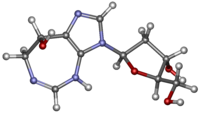Pentostatin
 |
|
 |
|
| Clinical data | |
|---|---|
| Trade names | Nipent |
| AHFS/Drugs.com | Monograph |
| MedlinePlus | a692004 |
| Pregnancy category |
|
| Routes of administration |
Intravenous |
| ATC code | |
| Legal status | |
| Legal status | |
| Pharmacokinetic data | |
| Bioavailability | n/a |
| Protein binding | 4% |
| Metabolism | Hepatic, minor |
| Biological half-life | 2.6 to 16 hours, mean 5.7 hours |
| Identifiers | |
|
|
| CAS Number | |
| PubChem CID | |
| IUPHAR/BPS | |
| DrugBank | |
| ChemSpider | |
| UNII | |
| KEGG | |
| ChEMBL | |
| ECHA InfoCard | 100.164.991 |
| Chemical and physical data | |
| Formula | C11H16N4O4 |
| Molar mass | 268.269 g/mol |
| 3D model (Jmol) | |
|
|
|
|
Pentostatin (or deoxycoformycin, trade name Nipent, manufactured by SuperGen) is an anticancer chemotherapeutic drug.
It is classified as a purine analog, which is a type of antimetabolite.
It mimics the nucleoside adenosine and thus inhibits the enzyme adenosine deaminase, interfering with the cell's ability to process DNA.
Cancer cells generally divide more often than healthy cells; DNA is highly involved in cell division (mitosis) and drugs which target DNA-related processes are therefore more toxic to cancer cells than healthy cells.
Pentostatin is used to treat hairy cell leukemia. It is given by intravenous infusion once every two weeks for three to six months.
Additionally, pentostatin has been used to treat steroid-refractory acute and chronic graft-versus-host disease.
Pentostatin is also used in chronic lymphocytic leukemia (CLL) patients who have relapsed.
...
Wikipedia
